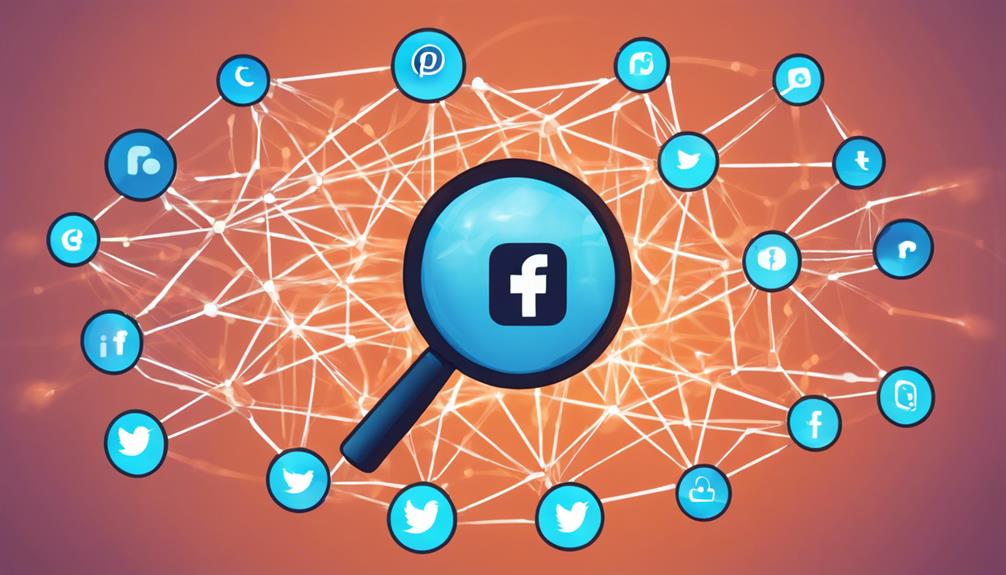
Social media backlinks are essential for your SEO as they link from social platforms to your website, significantly boosting your visibility and traffic. When you share valuable content, like blog posts or videos, these can be shared by others, creating links that lead users back to your site. Although they're typically nofollow links, meaning they don't directly impact your search engine rankings, they do help in enhancing brand credibility and can lead to faster indexing of your content. Importantly, the influx of diverse traffic from social media can indirectly improve your rankings. By exploring further, you'll discover more ways these backlinks can benefit your SEO strategy.
Understanding Social Media Backlinks

Social media backlinks are links from social media platforms that point back to your website. These links are crucial in today's digital marketing landscape. They occur when your content, whether a blog post, video, or infographic, is shared or mentioned on platforms like Facebook, Twitter, or Instagram.
When someone clicks on these links, they're directed right back to your site.
You're probably wondering how you can start generating these links. It begins with creating shareable, high-quality content. This content needs to be engaging and useful enough that people want to share it with their followers.
Once you've got that down, actively promote your content on your social media profiles. Engage with your followers and encourage them to share your posts.
Benefits of Social Media Links
By leveraging links from social media, you'll see a significant boost in your site's traffic. This comes from the vast and diverse audiences active on platforms like Facebook, Twitter, and Instagram. Each click translates to higher visibility and potential engagements that are crucial for your SEO rankings.
Moreover, social media backlinks can significantly enhance your brand's credibility and trust. When your content is shared or mentioned by users across their networks, it signals to search engines that people find your content valuable and relevant. This social proof isn't just beneficial for user perception but also impacts how search engines evaluate your site.
You'll also notice improved keyword rankings as a result of consistent social media linking. Although these links are typically nofollow, meaning they don't directly influence your site's authority through link juice, their indirect effects are undeniable.
They help in indexing your content faster. When your posts or pages are shared on social media, search engines can discover and crawl them more quickly, which can lead to a quicker ranking in search results.
Creating Effective Profiles

Having established the importance of social media links, let's focus on how to maximize their potential through crafting effective profiles.
First off, you'll want your profiles to reflect a consistent brand image. This means using the same profile picture, bio, and handle across all platforms. Consistency makes you recognizable and trustworthy to your audience.
Next, you need to optimize your bio. Your bio isn't just a space for a catchy phrase; it's prime real estate for backlinking. Include a straightforward, SEO-optimized description of what you do, sprinkled with relevant keywords that enhance your searchability.
Don't forget to integrate a clickable link back to your website. This link is crucial as it directs traffic from your social profiles straight to your site.
Also, make sure your contact information is up to date. List your business email and phone number if applicable. This step boosts your credibility and makes it easy for potential clients or collaborators to reach you.
Lastly, keep your profile fresh. Regularly update your bio to reflect any changes in your business or achievements. Staying current shows you're active and engaged, qualities that attract more followers—and potential backlinks.
Engaging Content Strategies
Your next step in harnessing the power of social media for SEO is developing engaging content strategies. It's crucial to craft content that resonates with your audience and encourages interaction. Start by identifying topics that align with both your brand's expertise and your audience's interests. Use tools like social listening and analytics to pinpoint trending subjects or frequently asked questions.
Once you've identified your topics, create content that stands out. Incorporate visuals like images, videos, and infographics to grab attention and enhance shareability. Remember, your content should always provide value, whether it's educating, entertaining, or solving problems. This approach not only attracts more views but also increases the likelihood of shares and comments, which are vital for SEO.
Interactive content is another key element. Polls, quizzes, and contests can drive engagement and encourage users to spend more time on your posts. The more engaged users are, the more likely they're to share your content on their own profiles, expanding your reach and backlink potential.
Boosting Link Visibility

Now that you've developed engaging content strategies, let's focus on boosting the visibility of your links. Social media platforms are dynamic tools to enhance the exposure of your content and backlinks. Here's how you can leverage them effectively.
First, you've got to share your content strategically. Don't just post links randomly; align them with trending topics or active discussions to catch more eyes. Use hashtags wisely to increase the reach of your posts beyond your immediate followers. Make sure these are relevant and popular enough to draw in a significant audience.
Engaging directly with your followers can also amplify your link visibility. When you interact through comments, live sessions, and Q&A rounds, you personalize the experience. People are more likely to click on a link posted by someone they feel connected with.
Analyzing Backlink Impact
After implementing strategies to enhance your link visibility on social media, it's crucial to measure the impact of those backlinks on your SEO performance. You'll want to check if there's an increase in your site's organic traffic, which can directly correlate to the effectiveness of your backlinks.
Use tools like Google Analytics to track referral traffic from social media platforms. This lets you see which platforms are sending the most visitors to your site, helping you focus your future efforts more efficiently.
Next, assess the quality of traffic. It's not just about quantity; you need visitors who engage with your content. Look at metrics such as bounce rate, average session duration, and pages per session. Improvements in these areas often suggest that your backlinks are attracting more relevant and interested audiences.
Also, monitor your search engine rankings for keywords associated with the backlinks. Significant improvements in rankings can indicate that social media backlinks are boosting your SEO efforts.
Frequently Asked Questions
Can Social Media Backlinks Directly Improve My Website's Google Rankings?
Social media backlinks don't directly boost your Google rankings, but they increase visibility and traffic, indirectly affecting SEO. You'll gain more exposure, potentially leading to links from authoritative sites that do improve rankings.
Do Nofollow Attributes on Social Links Affect Their SEO Value?
Nofollow attributes on social links do limit their direct SEO impact since they tell search engines not to pass on link equity. However, they can still drive traffic and enhance your online visibility.
How Often Should I Audit My Social Media Backlinks?
You should audit your social media backlinks quarterly to ensure they're effective and relevant. Regular reviews help you adjust strategies and maintain your SEO health amidst evolving algorithms and platform updates.
Are Backlinks From Newer Social Platforms as Effective as From Established Ones?
Backlinks from newer social platforms may not be as effective as from established ones because they typically have lower authority and smaller user bases, which can impact the SEO value they pass on.
What Are the Risks of Using Automated Tools for Social Media Backlinking?
Using automated tools for social media backlinking risks spammy links, which can damage your reputation and SEO. You'll face potential penalties from search engines and reduced engagement from your audience. Stick to organic strategies.
Conclusion
You've seen how vital social media backlinks are for your SEO efforts. By creating vibrant profiles and sharing engaging content, you boost your visibility across the web. Remember, every share and interaction increases your chance of gaining valuable backlinks. Keep analyzing the impact these links have on your site's performance to refine your strategies. Stay proactive and watch your online presence grow through the strategic use of social media in your SEO plan.






